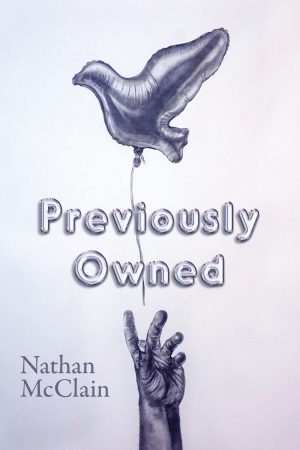That winter, snow dusted the hemlock, each spiked cone.Snow salted my hair—it was that long, that winter.A black bear cub curled beside me, hers a dark, honeyed sleep.If this were a fable, one could sleep the whole winterwithout interruption, that’s how long it felt as the bear cuband I kept each other warm. She had no clamp, no shackleor trap marks in her fur, of course I checked. Carefully,I peeled fat, gray ticks from her back, but I was gentlethen. Sometimes it was my turn to wadewaist-deep into the river, and that was fine. If we werelucky, there were fish, though no fish wouldconsider this luck. Sometimes the bear cub seemed to stalka smell, sniffing, I assumed her mother, but it couldhave been anything, that winter. You wonder whatthere is to learn here, other than this is not a fable.Other than, whenever I woke, the bear was always a bear again.
Myth of the Bear
Feature Date
- January 11, 2023
Series
Selected By
Share This Poem
Print This Poem
“Myth of the Bear” from PREVIOUSLY OWNED (c) 2022 by Nathan McClain.
Appears with permission of Four Way Books.
All rights reserved.
Reproduced by Poetry Daily with permission.

Nathan McClain is the author of two collections of poetry—Previously Owned (2022) and Scale (2017)—both from Four Way Books, a recipient of fellowships from The Frost Place, Sewanee Writers Conference, Bread Loaf Writers Conference, and a graduate from the M.F.A. Program for Writers at Warren Wilson. A Cave Canem fellow, his poems and prose have recently appeared or are forthcoming in Plume Poetry Anthology 10, The Common, Guesthouse, Poetry Northwest, and Zocalo Public Square, among others. He teaches at Hampshire College and serves as poetry editor of the Massachusetts Review.
"In Previously Owned, America’s dark history is not quaintly rooted in the past, but dangerously ever-present. ‘And what / have you learned from / standing here so long / examining pain?’ Nathan McClain questions in the opening poem ‘Boy Pulling a Thorn from His Foot’—not just the reader—himself as witness. If Scale, his first collection, can be said to be anchored in domestic space, then Previously Owned expands the architecture of that domestic space to include Country and the country. The ways in which McClain troubles the pastoral and peripatetic traditions thrills me: ‘I’ve never actually seen a moose, / only signs warning of moose, / and NO PASSING ZONE signs’ (‘Where the View Was Clearer’); and of the fireflies in ‘Now that I live in this part of the country,’ ‘look, they / flash the way hazard / lights sometimes flash… / and I might have said, no, / don’t they seem to pulse / with the glow of old / grievances?’ This book is a triumph and will be talked about for years. Nathan McClain is one of the most daring poets I know."
—Tommye Blount
"The opening poem of Nathan McClain’s Previously Owned operates like the legend of a map, a key to the book’s existential topography. The poem’s presenting subject is a Roman sculpture of a boy pulling a thorn from his foot, or ‘not pulling / rather, about to pull.’ McClain addresses the self via the second person, and draws in the reader, too, as observer: ‘and here you / are, looking,’ witness to the boy’s ‘insistent grief.’ ‘And what // have you learned from / standing here so long examining pain?’ Previously Owned exists in this incremental space—the about to pull, the almost, the grief, the tenderness, the examination, and the distance. It’s a masterstroke in a masterful collection, in which a speaker of a nuanced intelligence and lush interiority reflects upon the American landscape, its pastoral and judicial and historical duplicity entwined with racial alienation and violence. McClain has written a collection of sculptural artfulness—through which the thorn of grief thrums still."
—Diane Seuss
"Nathan McClain’s Previously Owned is no-nonsense, meat and potatoes, good gotdam poetry. Careful readers will appreciate how exquisitely crafted are his lines, how resonant his images, how thoughtful his progressions. What’s more, McClain’s second volume shows us a writer who, like Robert Hayden before him, neither ignores nor is encumbered by his country’s complicated history. His topics range widely and the whole of the human landscape—physical, psychological—is his, and ours, for the roaming."
—John Murillo
Poetry Daily Depends on You
With your support, we make reading the best contemporary poetry a treasured daily experience. Consider a contribution today.




